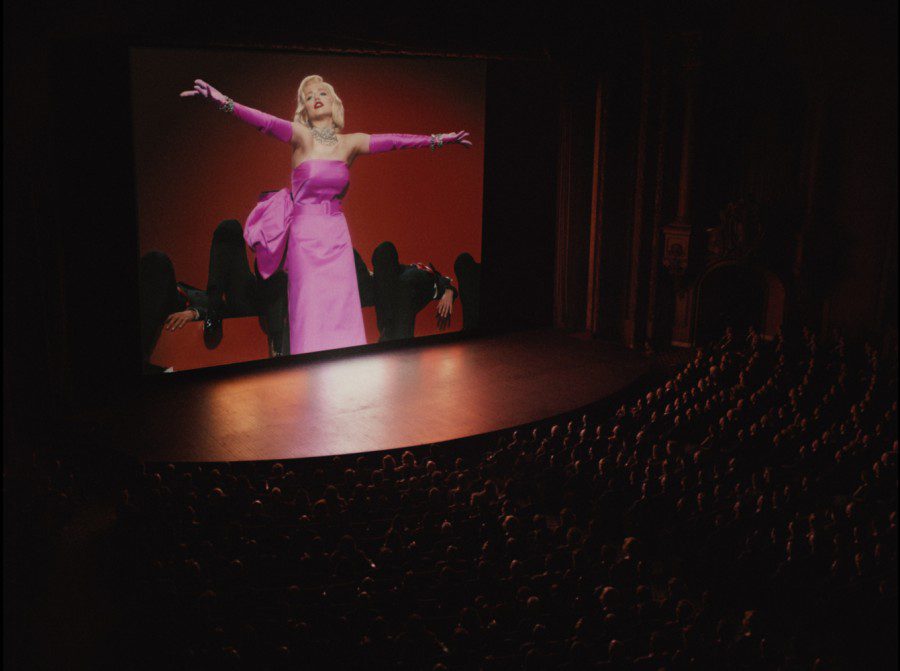Review: With ‘Blonde,’ Hollywood continues to punish Marilyn Monroe
We should leave Marilyn Monroe alone and finally look at her life in the way she herself lived it.
Director Andrew Dominik’s “Blonde” is based on Joyce Carol Oates’ 1999 novel. (Courtesy of 2022 © Netflix)
October 14, 2022
Content warning: This article discusses sexual, physical and emotional abuse.
Spoiler warning: This article includes spoilers for ‘Blonde.”
Marilyn Monroe is someone nobody can let rest in peace. Her public image is composed of a Hollywood fantasy of glamor that audiences still believe in and consume. Her life, however, was plagued by trauma and tragedy — having absent parents, growing up in the foster care system, being objectified in her film roles, struggling with mental illness, having her intelligence questioned and falling into drug abuse. These hardships are often ignored to uphold the image of the picture-perfect movie star.
The latest addition to the Monroe pop culture canon is Andrew Dominik’s “Blonde,” which was released on Netflix on Sept. 16, and is based on Joyce Carol Oates’ 1999 novel of the same name. As Oates’ novel is a fictional retelling of Monroe’s life, the film takes plenty of artistic liberties. While it’s a refreshing take on the traditional biopic, the film ignores that Monroe was a human who experienced great suffering in addition to her success.
Monroe, born Norma Jeane Mortenson, was raised by her impoverished single mother Gladys (Julianne Nicholson), whose emotional and physical abuse shattered the self-esteem of a young girl (Lily Fisher) already coping with an absent father. When Gladys’ struggle with her mental health intensified, she was institutionalized for life, and young Norma Jeane was sent to an orphanage to fend for herself in the foster care system. Sadly, this is the only part of the movie that gives audiences a raw, emotional point of view of experiences; her pain is visible in her screams and tears, and the panic is too hard to bear. It is always heartbreaking seeing a young girl lose a relationship with the two people that brought her into this world.
Under the stage name “Marilyn Monroe,” however, a grown-up Jeane (Ana de Armas) is victimized by the men she interacts with — all of whom display little, if any, sympathy for her. She meets with a studio executive named Mr. Z (David Warshofsky), who rapes her in exchange for casting her in better roles. Her talent agent I.E. Shinn (Dan Butler) forces her to conform to the bombshell persona that she has been typecast as throughout her entire career.
Monroe finds herself in an emotionless threesome with nepotism babies Charles Chaplin Jr. (Xavier Samuel) and Edward G. Robinson Jr (Evan Williams). Her encounter with John F. Kennedy (Caspar Phillipson), only referred to as “The President,” sees an intoxicated Monroe dragged by Secret Service officers into a hotel bed and forced to fellate him. It also doesn’t help that in her romantic relationships, Monroe calls most of the men “Daddy” in desperation.
Monroe was married three times, with two of her marriages featured in “Blonde” — her second with baseball legend Joe DiMaggio (Bobby Cannavale), and her third with playwright Arthur Miller (Adrien Brody). DiMaggio physically assaults Monroe due to nude photos of her that were publicly released and her desire to film the infamous white dress scene in “The Seven Year Itch.” In her marriage with Miller, she is taken advantage of intellectually, as Miller takes her words and includes them as dialogue in his plays. These two marriages ensure the viewer that, besides sexually abused, Monroe was also physically and emotionally exploited by the men around her.
Monroe herself suffered from endometriosis, but her fertility struggles are ignored in favor of making an exploitative anti-abortion stance. The film portrays her getting pregnant on several occasions, complete with CGI fetuses that “talk” to her. “You won’t hurt me this time, will you?” one asks her after she had a prior abortion.
The one saving grace of this movie is recent Bond girl Ana de Armas’ performance as Monroe. Despite the shallow dialogue, de Armas makes Monroe entertaining to watch. At times, de Armas even empowers Monroe, notably when she frequently reminds the men she works with that her name is Norma Jeane. Similarly, she expresses frustration to her talent agent about how she was paid significantly less than co-star Jane Russel in the 1953 film “Gentlemen Prefer Blondes.”
There is something exciting and breathtaking about seeing an actor fully immersed in the persona of someone so iconic, and for that, de Armas deserves praise. So does the production design for the film, in which Monroe’s most iconic looks are recreated as if a living resurrection of the past.
Still, de Armas can’t save “Blonde” from the oppressive lens through which Dominik frames Monroe’s life. While the several dream sequences are beautiful and move the plot along, they do nothing to help humanize Monroe. Instead, these sequences make it seem like Monroe’s life was a fantasy — one that didn’t include the struggles and abuse it did. Not even her fatal 1962 barbiturate overdose is immune to this imaginary and heartless approach.
If Dominik was so inclined to present a biopic in this matter, Monroe wasn’t the most appropriate pick. In fact, the only option that I see possible would be to frame the story around the life of a fictional subject.
I am upset that Monroe’s legacy has been dehumanized even further, and frustrated that the perfect opportunity to give her a voice and an authentic look at her life was sabotaged. I hope that in the near future, we are able to finally look at her life in the way she herself lived it, and not around a Hollywood-catered dreamland that continues to circulate. Her life was far from a fantasy and we need to pull that curtain away.
Contact Madeline Kane at [email protected].
























































































































































